MercoPress. South Atlantic News Agency
Tag: World Bank
-
Wednesday, July 8th 2015 - 07:50 UTC
World Bank claims there's 'no crisis in Latin America', but poverty still prevails
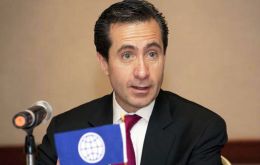
The World Bank’s Vice-President for Latin America and the Caribbean, Jorge Familiar, praised the region’s implementation of economic reforms, claiming that they had led to poverty reduction in the last few years, but he also warned that its pace was decreasing.
-
Friday, June 12th 2015 - 06:02 UTC
World Bank forecasts Argentina will regain access to capital markets in 2017

The World Bank is optimistic about the outlook for the Argentine economy, predicting the country’s GDP will grow 1.1% this year, a considerable upgrade from the decline of 0.3% it expected in January, and perhaps even stronger growth of 1.8% in 2016 and of 3% points in 2017, thanks to a “stronger” macroeconomic environment and “regained” access to international capital markets.
-
Tuesday, April 21st 2015 - 01:16 UTC
World Bank warns Latin America about permanent slowdown in the absence of structural reform
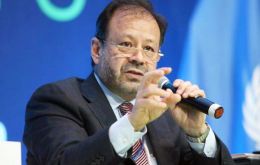
In its latest semiannual report, “Latin America Treads a Narrow Path to Growth: The Slowdown and its Macroeconomic Challenges,” the World Bank´s Office of the Chief Economist for Latin America and the Caribbean forecasts a fourth year of slow growth for the region.
-
Wednesday, March 18th 2015 - 08:20 UTC
EU main economies announce plans to join China-led development bank, despite US warning

France, Germany and Italy on Tuesday announced plans to join the Chinese-led development bank AIIB, drawing concern in Washington which views the institution with skepticism. The three European countries want ”to become founding members of the Asian Infrastructure Investment Bank (AIIB)”, they said in a statement.
-
Monday, March 16th 2015 - 10:25 UTC
UK caught on the wrong side in a US/Beijing dispute over Chinese development bank
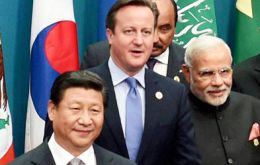
The US has expressed concern over the UK's bid to become a founding member of a Chinese-backed development bank. The UK is the first big Western economy to apply for membership of the Asian Infrastructure Investment Bank (AIIB) despite the fact that US has raised questions over the bank's commitment to international standards on governance.
-
Wednesday, January 14th 2015 - 09:31 UTC
World Bank cuts 2015 global growth forecast; however lower oil prices will delay rate hikes
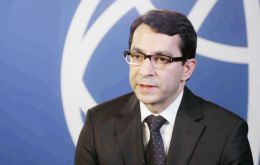
The World Bank on Tuesday cut its global growth forecast for 2015 and lowered the estimate for 2014, as several headwinds mitigate the effects of an improving U. S. economy and plunging oil prices.
-
Monday, November 17th 2014 - 06:06 UTC
UK will not support World Bank loans to Argentina; British public opinion against such aid

The United Kingdom contributions mostly through World Bank loans and aid to Argentina have again been questioned in Britain with demands on Prime Minister David Cameron to block British taxpayers cash going to the country which has 'precarious finances' and a long standing demand over the Falkland Islands sovereignty.
-
Wednesday, November 5th 2014 - 05:16 UTC
Chile chosen by World Bank for Latam’s first Research and Development Center
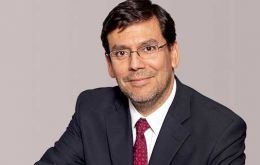
Chile’s Finance Ministry Alberto Arenas, and the World Bank Group (WBG), represented by its Vice President for Latin America and the Caribbean, Jorge Familiar, signed a cooperation agreement to establish in Chile the first Research and Development Center in Latin America, and the second outside Washington, DC.
-
Thursday, October 30th 2014 - 10:53 UTC
Looking to “Doing Business” in Latam, try the Pacific Alliance, forget Mercosur
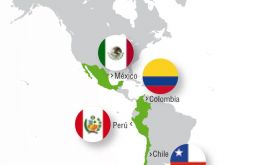
The World Bank's “Doing Business” global rating is not very enthusiastic about Latin American and the Caribbean which only first surfaces in position 34 out of the 189 countries considered.
-
Thursday, October 9th 2014 - 06:51 UTC
World Bank staff strike off; chief financial officer declines part of annual bonus
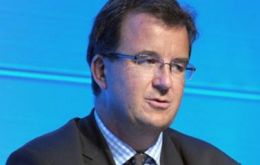
The World Bank chief financial officer is giving up part of his bonus after an uproar over cost-cutting measures at the lender. Bertrand Badre will decline the remainder of his 94,000 dollar annual bonus, the bank said.
